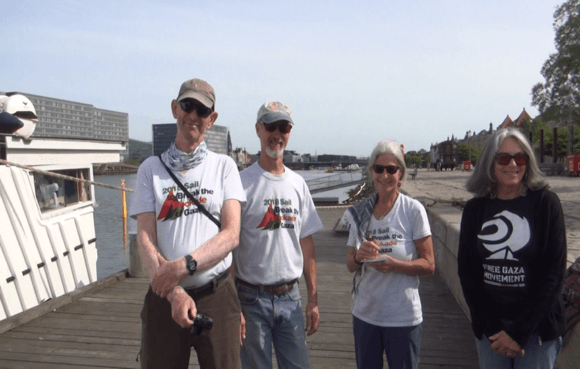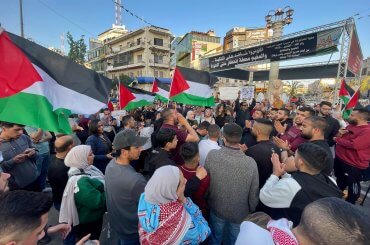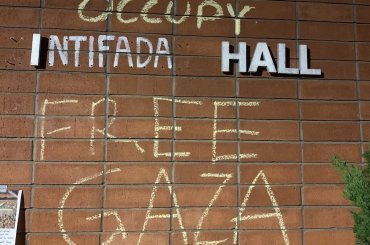There is a Freedom Flotilla to Gaza taking place this summer with several boats from various countries. Several boats docked in Copenhagen for a couple of days as part of their journey to Gaza, which they plan to reach in late July.
From 2008 through to 2016, 31 boats have challenged the blockade. (The flotillas took a break in 2017.) These boats sail to challenge Israel’s Naval blockade on Gaza, part of its siege of Gaza that has lasted more than a decade. Although several boats managed to get through the blockade in the first years, Israel tightened its grip against what was becoming a serious PR issue, and this tightening climaxed in the most deadly incident in that history, the attack on the Turkish Mavi Marmara in 2010, in which 10 activists were killed by the Israeli commandos in international waters.
I had the pleasure of interviewing crew member Zohar Chamberlain Regev, who also happens to be Jewish-Israeli and residing in Spain. Our interview aboard the bigger Al-Awda boat is an hour long. While the full interview can be viewed here, I will provide some highlights from it below.
Zohar is a member of the Freedom Flotilla Coalition, and has participated in two freedom flotillas to Gaza, in 2012 and 2015, but has never before reached the “confrontation point”, as she will do this time.
I asked her how she feels about reaching the “confrontation point”, which is bound to be somewhere very far from Israel in international waters, where she is likely to get arrested by the Israeli navy, and possibly worse, in light of the past deadly confrontations.
Zohar:
“Well, first of all, we feel it must be done. The fact that the illegal blockade on Gaza goes on, forces us to keep acting against it. And our direct action – non-violent direct action – is directed just as much towards the Palestinians of Gaza, in solidarity with them, as it does towards the international community, civil society, in order to put pressure upon the governments of the world to actually make Israel lift the blockade. So the issue of actually getting into Gaza, or being intercepted, is beside the point. What we do is what we do here in Copenhagen. We just raise the issue, we explain to people what’s happening in Palestine, what’s happening in Gaza, we explain how it’s illegal according to international law – the blockade on Gaza is used by Israel as collective punishment which is prohibited by the Geneva conventions. So we have to do it.”

We talk about the notion of criticism and protest against Israel being labelled as criminal, as for example the BDS laws accusing people of “delegitimizing” and Israeli ministers accusing activists of being “terrorists”.
Zohar has been stopped several times at the Ben Gurion airport and questioned for her activities. Last time she entered Israel was in 2015, and she was accused by the interrogators of “delegitimization”. She was asked to go to a “police station” in Tel Aviv, which turned out to be a Shin Bet secret service center. Zohar was asked about her activities, but refused to give out more information without a lawyer, and they let her go. If Zohar was not an Israeli citizen, she would most likely be denied entry to begin with.
Zohar:
“What we just try to do is counteract this Israeli propaganda that says that we’re delegitimizing Israel. The BDS, or the direct action of the Flotilla is not delegitimizing anything – we’re just exposing the reality. And what Israel does, with its policy, is delegitimizing its existence”.
I mention the recent BDS entry ban on various international organizations, including Jewish Voice for Peace, and say that even Jews don’t seem to be that protected by Israel anymore – that it’s becoming more a question of what kind of Jews they are, and whether they support Israeli policy or not. I ask Zohar where she thinks it’s going.
Zohar:
“I’m just thinking about Germany in the 1930’s. To me, I think this is where the Israeli society is going. So I don’t know what they’ll do with me. They could accuse me of treason, or whatever – I don’t know. It’s also a question of what would serve their purpose. They don’t want us to get any publicity – so I don’t now what they’ll do. But I’m really worried about this trend in the Israeli society, where everything is twisted. I just read today, about the demonstrations in Haifa against the shootings in Gaza, and the demonstrators say, ‘we just say that Arabs and Jews don’t want to be enemies, and our opponents say yes to killing, and then we’re portrayed as supporting terrorism, and they’re portrayed as really tolerant’. You know, this is all really like George Orwell’s 1984. […] To me it’s a very personal thing. I see my society, I see that it’s going through a pathological process, and I’m just worried, and I think we have to do something. As Israelis, you know, we have double-triple obligation to counteract this terrible process.”
We talk about the recent Great March of Return and its resultant massacres, and about how Palestinian Gazans have tried to make themselves visible through these protests.
I spoke of the sad and cruel logic of the fact that the Gaza protesters were literally paying with their lives to become visible. And that the flotilla crew is also trying to make Gaza visible by sailing there, even if they do not expect to reach Gaza’s shores.
Zohar responded:
“Exactly that. It’s unfortunate, but it seems media will not pay attention unless you actually do something. So we’re just a bunch of people, normal people, from all walks of life, from 10 or 12 different countries, just trying to do something – basically to save our own conscience. What will you say to the next generation? What did you do when Gaza was dying? What did you do when Palestine was suffering, being so visible? And it’s breaking the media blockade that’s our biggest challenge. Whether we actually get to break the physical blockade on Gaza is sort of secondary. And that is why we’re doing all these interviews in hope that the word will get out there. And actually coming into Copenhagen yesterday, just seeing all the people who see us, and maybe, you know, something will click. We are suffering in this age of an overdose of information, and it’s so difficult to see what you don’t want to see. You know sometimes when a boat just passes by and you see this [Palestinian] flag, it makes you wonder ‘why? Why are these people doing that?’ – this is what we’re trying to do. And this is why the journey is more important than the destination.”
And with those profound words, our interview ended. The flotilla has continued on in their journey towards Gaza. Will they ever reach the Gaza shores? Zohar is not worried. The journey is more important than the destination, and the message of solidarity that these activists carry is a mission in and of itself.




“…was the Israeli commando attack on the Turkish Mavi Marmara in 2010, in which 10 activists were killed by the Israeli soldiers in international waters.”
Executed. Including Furkan Dogan. American. Shot four times to the head while prone on the deck of the ship. His name should be as common as Rachel Corrie’s, whose name should be as common as Anne Frank’s. But…..
May I remind commenters here about another attempt previously, and it ended when boats were deliberately damaged by some vicious elements. They’d better make sure these boats are secured.
“A Swedish ship due to join an upcoming Gaza-bound aid flotilla has been sabotaged in the Greek port of Piraeus, organisers say.
In a statement, they said “hostile divers had destroyed the propeller house and cut the propeller shaft” of the vessel Juliano on Monday.
The ship is part of the 10-vessel Freedom Flotilla II that is expected to set sail from Greece and elsewhere for the Gaza Strip in the coming days in a bid to break Israel’s blockade of the Palestinian territory.”
June 2011
https://www.currentaffairs.org/2018/05/propaganda-101-how-to-defend-a-massacre
“Propaganda 101: How To Defend A Massacre”
“An introductory course in massaging your crimes and dehumanizing your enemies…”
by Nathan J. Robinson, May 21/18 – Current Affairs.
EXCERPT:
“If you are a human being, as you probably are, you might think it would be difficult to explain away the massacre of several dozen people. And you might think that it would be difficult to get justifications for mass murder printed in one of the world’s leading newspapers. You would, however, be mistaken. Propaganda defending murder is both simple to produce and alarmingly common in major media outlets.
“In order to understand how people can defend acts that should shock the conscience, today we’re going to examine and dissect a particularly galling example. Last week, 60 Palestinians were killed, and 1700 wounded (including being permanently disabled) by the Israeli military during the Nakba protest, when Palestinians attempted to breach the fortified wall surrounding Gaza. Much of the news coverage in the New York Times was already disturbingly one-sided, and the paper ran a front-page story on how Palestinians’ deaths made Israelis feel (they ‘hoped every bullet was justified’) while suggesting that Gazans exploit their own suffering for ‘political’ ends (it’s a place ‘where private pain is often paraded for political causes’). But yesterday, the paper topped itself, running an op-ed from Jewish Journal editor Shmuel Rosner titled ‘Israel Needs to Protect Its Borders. By Whatever Means Necessary.’
“Rosner fully justifies the massacre, with no apologies, regret, or second thoughts. He believes the killing of these Palestinians was correct, and that they deserved to die. Now you might, as I do, think this attitude is so self-evidently barbaric that even to debate it is to surrender a little bit of one’s humanity. But Rosner’s position is not a fringe one, and the good liberals at the New York Times consider it within the boundaries of reasonable discourse, so unfortunately we have not yet achieved the kind of world in which such thinking is ‘self-evidently’ immoral. (This reflects very badly on all of us.) I’d like, then, to go through Rosner’s argument paragraph by paragraph, to show how he constructs his defense of murder, why it might be persuasive to people, and why it fails and should horrify everyone.”
We find it interesting that Jonathan Ofir fails to acknowledge Free Gaza’s five successful voyages to Gaza in 2008. We hope this isn’t another case of an Israeli rewriting history.
In August 2008 Free Gaza defied the Israeli Foreign Office by refusing to submit to its demand that we abandon our challenge of Israel’s blockade of Gaza. Though warned our boats would not be allowed to pass through the blockade, we left from Cyprus and set sail for Gaza. After 33 hours, FREE GAZA and LIBERTY were greeted by 40,000 overjoyed Palestinians who had waited all day at Gaza port for our arrival. We then made four more successful voyages, taking in members of the European Parliament, a Nobel Peace Prize winner, journalists like Amira Hass, Palestinians who just wanted to go home, and activists who remained in Gaza to work with the International Solidarity Movement.
It was the attacks on the DIGNITY, our third boat, in December 2008 and on the SPIRIT OF HUMANITY in July 2009 that motivated the Free Gaza board to organize the first large Freedom Flotilla in May 2010. Concluding we could no longer send just one or two boats at a time to break Israel’s unlawful siege, we spent the next year organizing a flotilla, along with partners we recruited to join the initiative. These partners included the Turkish charity, IHH, The European Campaign to end the Siege, the Malaysian Initiative of Mahathir Mohamad
and the Swedish/Greek effort. All of them contributed boats, supplies and passengers. This voyage was to become Freedom Flotilla 1.
Israeli pirates firing from attack helicopters executed ten of our passengers, including Furkan Dogan, an American while we sailed in international waters. Many passengers on board all six boats were injured by gunshots and flying glass, Dozens of passengers were beaten, resulting in many broken bones. One passenger’s nose was deliberately broken. All passengers were violently robbed of cameras, cell phones and computers to cover up all evidence of the attack. In addition, over a million dollars in cash, valuables and equipment was confiscated and never returned.
Passengers were then brutally kidnapped, forcibly transported to Israel and imprisoned, Many of the survivor testimonies can be found here: http://archive.freegaza.org/en/boat-trips/survivor-testimonies.html
Although the Mavi Marmara ship was far bigger than all the other boats , it was not leading the initiative which was organized by the Free Gaza movement.
http://www.freegaza.org/history-freegaza-boats-to-gaza/
We set a precedent that it was possible to break the blockade and enter the port of Gaza. If it weren’t for out five successful trips, there would have been no other boats sailing to that small slice of the Mediterranean.
Greta Berlin and Mary Hughes Thompson, Co-Founders, the Free Gaza movement
Once again, although I am a previous flotilla participant (2010 Freedom Flotilla), I object to the continued attempts to carry on with an action that has long since served its purpose and serves little purpose now. These are expensive enterprises that, in almost all cases, wind up with a seizure of the boats and any valuables on the vessel or activists involved, a couple of days in Israeli prison and practically no media coverage – at least no ACCURATE non-Zionist controlled media coverage. And, if the argument for doing so is that it gives the people of Palestine inspiration to know there are still internationals striving for their freedom, I’m not so sure that’s so true anymore.
The Palestinian people, I believe, must take matters into their own hands if they have any hope of securing their freedom. What they are doing on the Gaza border is, arguably, a step in the right direction. The intense suffering, while very painful to observe, is necessary to reach their goal, which is dependant upon the end of Zionist power. Violent actions like those of the IDF against the peaceful demonstrators of Gaza are awakening many more in the world to the evils of Zionism, which will hasten its demise.